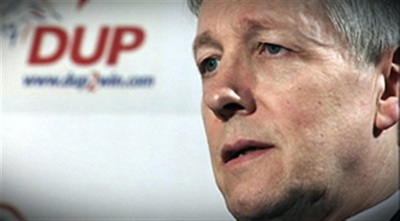
Nationalists have dismissed claims by DUP leader Peter Robinson that the union is “more secure” than ever as political tensions escalated ahead of the centenary of the Ulster Covenant.
Sinn Fein and the SDLP both reacted strongly to a speech made by the First Minister at a dinner to mark the signing of the Covenant, a declaration of militant unionist intent framed in response to the advance of Irish nationalism 100 years ago.
Speaking to an audience of around 300 people at Belfast City Hall, Mr Robinson said “the union is more secure than before and has defied all those in Britain and Ireland who conspired to wrench Northern Ireland from the union”.
“This present generation also faced a relentless campaign to destroy our link with the rest of the United Kingdom. Our people endured and resisted a 40-year campaign of terrorism but remained determined to preserve the union -- and they too succeeded.
“And, let us be clear, future generations will also have to defend that historic union -- and I am certain that they too will succeed,”
In a clear attack on Sinn Fein and the SDLP, Mr Robinson also hit out at those who use the term ‘the North’ to describe the Six Counties, insisting it be referred to as ‘Northern Ireland’.
“People are entitled to have their own vision for the future but it is an act of denial and disrespect to assiduously avoid using the proper title,” he said.
Sinn Fein Belfast city councillor Jim McVeigh said there was no evidence to support Mr Robinson’s claims about the union.
“Indeed all of the electoral and demographic evidence point to the contrary,” he said, calling for a border poll which he said was being blocked by unionists.
“Others including unionists have sought to block it happening. People have to ask themselves the question, why?”
He accused unionists of lacking in confidence.
“There is a need to approach the next decade of commemorations in a sensitive and rational fashion.
“Engaging in revisionism or seeking to use historical events to bolster party political positions in the here and now smacks of a lack of confidence in your current position and does a disservice to the past,” he said.
Tensions between unionists and nationalists at the Belfast Assembly in Stormont have been elevated recently, with some commentators comparing the displays of open hostility to Belfast city council in times past.
Peter Robinson accused Sinn Fein of ‘sectarianism’ after the party voted in favour of a motion to censure DUP minister Nelson McCausland over the parades dispute.
The unsuccessful SDLP motion sought to exclude DUP Social Development Minister Nelson McCausland from office for three months, claiming he had breached the ministerial code of conduct and pledge of office by failing to promote good community relations and not condemning actions contrary to the rule of law.
The assembly motion required cross-community support and was doomed to failure due to the backing of McCausland by the DUP and the Ulster Unionists.
Mr Robinson said of the motion: “There is only one purpose, a purpose upon which the SDLP and Sinn Fein are united and that’s to raise tensions in the preliminary stages of a march that will take place this weekend, no other purpose. They have been doing it outside this chamber -- that’s why I know that this is part of that same proposition.”
Sinn Fein’s Martin McGuinness said in a subsequent newspaper interview that despite the scenes at Stormont, his relationship with Peter Robinson was still good.
He said there had been a lot of “straight talking” between him and Mr Robinson since a loyalist band, Young Conway Volunteers, was filmed marching in circles while playing sectarian tunes outside Saint Patrick’s Church in northBelfast on the Twelfth of July.
“I think the atmospherics over the last couple of weeks flowing from the ridiculous event outside St Patrick’s Church have not been good for community relations on the streets.
“But I think he and I know each other very well and both of us are very committed.
“Actually at one stage in the early stages of us coming together in government both of us privately agreed with each other that no matter what happened on the street we would not let that come between us and we would use our good offices to ensure, not alone does the peace process continue but to go from strength to strength.”
![[Irish Republican News]](https://republican-news.org/graphics/title_gifs/rn.gif)
![[Irish Republican News]](https://republican-news.org/graphics/title_gifs/harp.gif)

